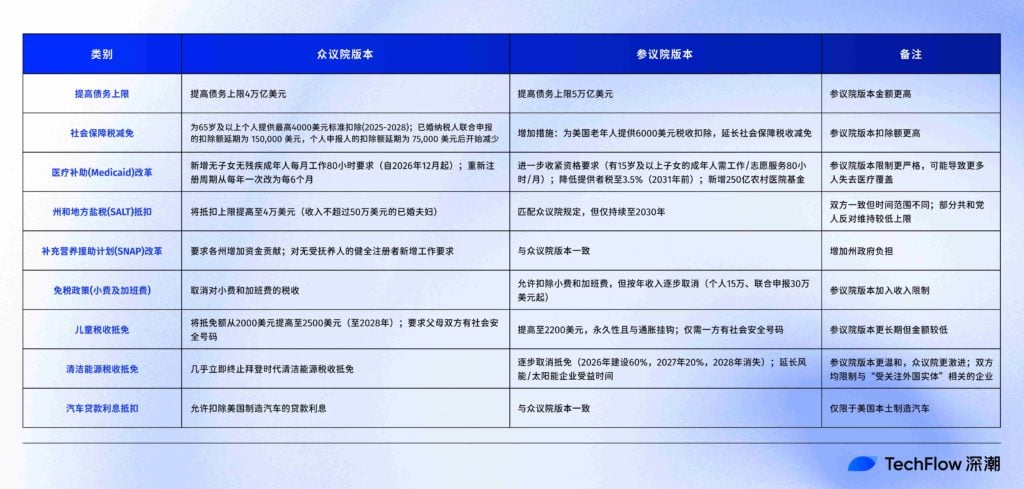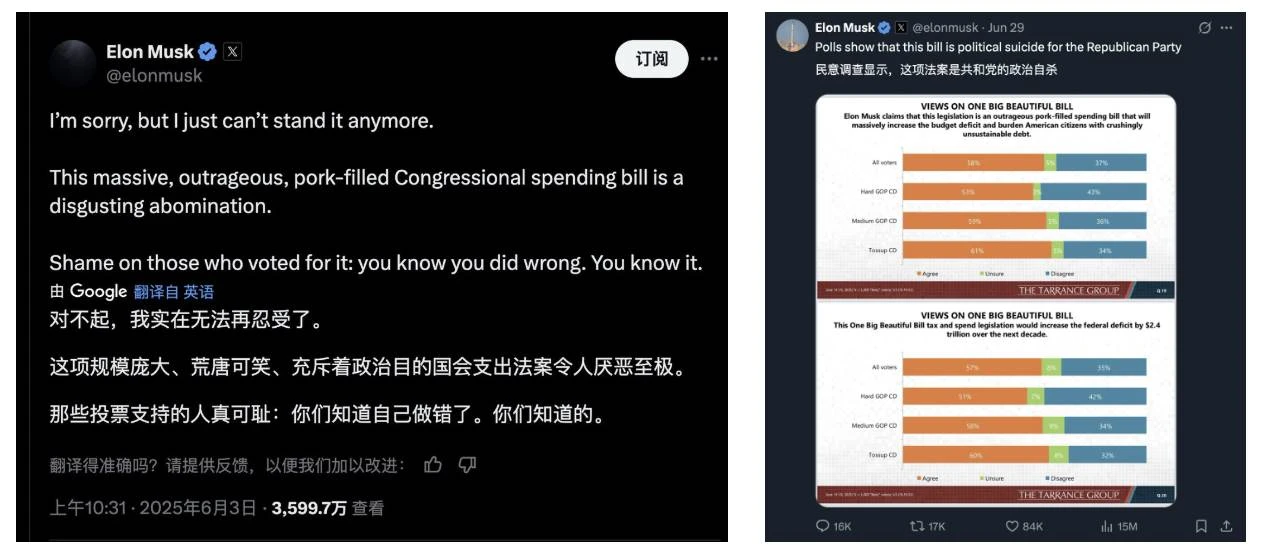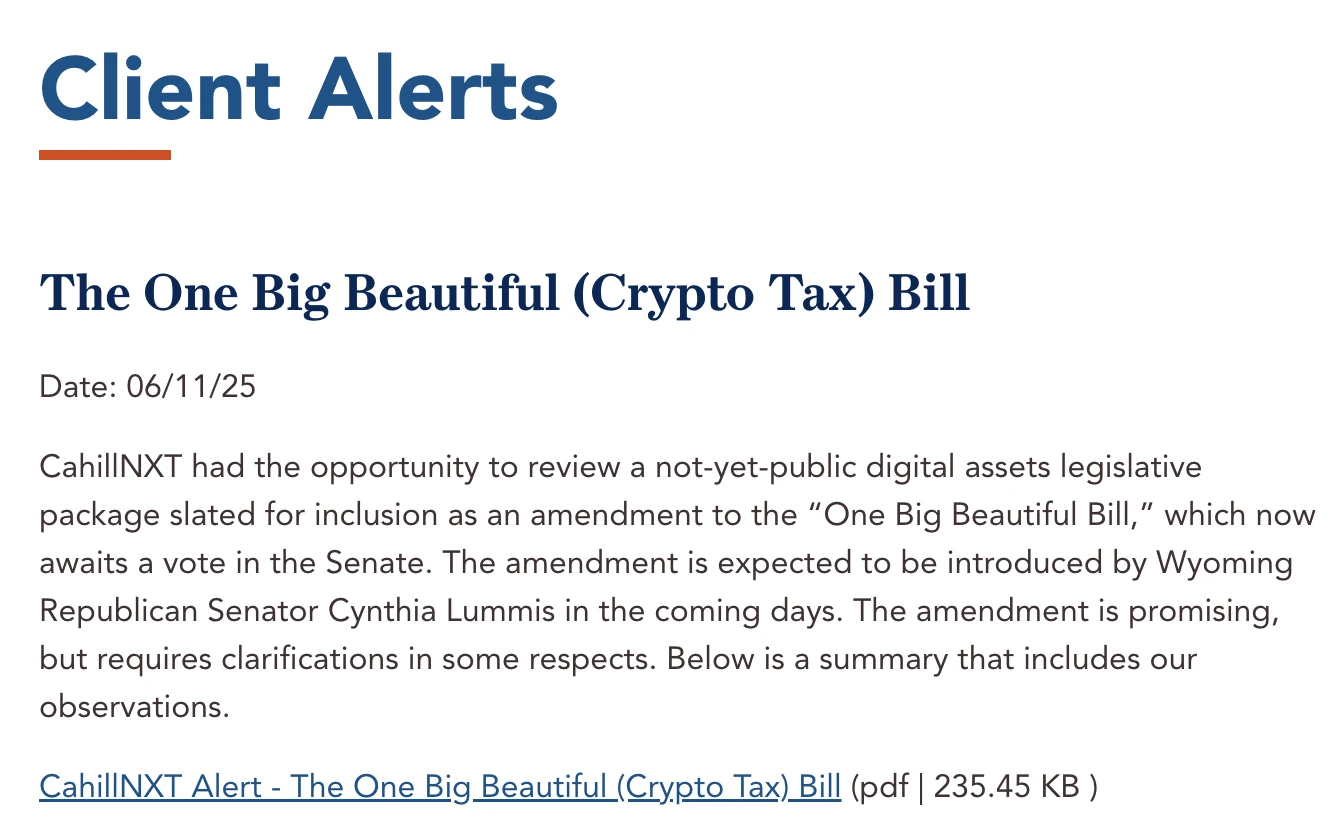Three trillion dollars in tax cuts, 1.13 trillion in spending reductions, 1,118 pages of bill text... A super bill called the "One Big Beautiful Bill Act of 2025" (OBBBA) is reshaping the U.S. economic landscape, simultaneously sparking a new dispute between parties and even making Musk "furious".
On July 1st, Musk posted on the social platform X, stating that if the current "crazy spending bill" (the "Big and Beautiful Bill") is passed, he will establish the "America Party" the next day to protest the bill.
As a signature policy of Trump's second term, this bill can be described as "all-encompassing", carrying the Republican Party's ambitions and igniting intense social controversy.
This article will delve into the core content of the "Big and Beautiful Bill", the discussions it has triggered, and its potential impact on the crypto industry, exploring the full picture of this legislative storm.
Big Bill
The "Big and Beautiful Bill" is a large-scale tax and spending bill promoted by U.S. President Donald Trump in 2025, covering six major areas including tax reform, medical reform, immigration policy, defense budget, energy policy, and education and welfare reform.
As a landmark legislation during Trump's second term, it attempts to stimulate the economy through large-scale tax cuts, increased spending, and policy adjustments, while addressing fiscal, immigration, and national security issues.
The bill text is 1,118 pages long, containing 237,327 characters, involving complex clauses, with the Senate taking 16 hours to read the full text word by word during bill review. According to a BBC report on June 28th, the core content of the "Big and Beautiful Bill" includes the following nine aspects:

According to Tax Foundation calculations, the "Big and Beautiful Bill" is expected to reduce federal tax revenue by approximately 3.3 trillion dollars through tax cut policies between 2025-2034 (dynamic estimation), while increasing defense spending by about 150 billion dollars, mainly for missile defense, ammunition, and ship construction. Meanwhile, the bill will also significantly reduce spending by about 1.13 trillion dollars, including an 800 billion dollar reduction in Medicaid and saving 330 billion dollars through student loan program reforms.
Economically, the bill will increase long-term GDP growth by 0.6%, but reduce capital stock and pre-tax wages by 0.2% and 0.1% respectively, and create about 794,000 full-time jobs. Ultimately, the bill is expected to increase the deficit by 3.3 trillion dollars between 2025-2034, with potential long-term fiscal sustainability risks due to high interest rates and private investment crowding-out effects.
Additionally, the Congressional Budget Office (CBO) estimates that if the bill is implemented in the House version, it will increase U.S. debt by 2.4 trillion dollars, reduce purchasing power for the bottom 10% of households by 4% between 2026-2034, while increasing purchasing power for the top 10% of households by nearly 3%, sparking a "rob the poor to help the rich" controversy.
But the dispute is far from over.
Big Dispute
The "Big and Beautiful Bill" was first published by the U.S. House Ways and Means Committee on May 12th, 2025, passed in the House on May 22nd with a narrow margin of 215 to 214 votes, and passed a procedural vote in the Senate on June 28th with a 51 to 49 vote, entering the formal review stage, expected to be signed into law by Trump before the July 4th U.S. Independence Day holiday. Due to its massive scale, complex content, and far-reaching impact, it has become the focus of U.S. political and social discourse, triggering widespread controversy and heated discussion.
The bill's proponents view it as a core agenda of the Trump administration. Supporters believe that through tax cuts and increased defense spending, the bill will stimulate economic growth and enhance national security, especially the tough immigration and border policies that have gained support from some voters.
However, internal Republican divisions are evident, with some hardliners demanding further cuts to social welfare expenditures, while moderates hope to retain programs like medical assistance, worried that the bill might increase deficits and impact low-income groups.
The two votes on May 22nd and June 28th were passed by narrow margins, indicating party internal opinion divisions.
Beyond party divisions, what is more widely known is the strong opposition from Elon Musk, former head of the Government Efficiency Department (Doge) and Tesla founder. Based on this bill, Musk's long-distance argument with President Trump is seen as a symbolic sign of their public falling out. Since June 3rd, he has called it "massive, absurd, and extremely disgusting", and after the recent procedural vote on June 28th, he still firmly believes this is a "political suicide" for the Republican Party.

Musk criticized the bill for causing a significant budget deficit, expecting next fiscal year's deficit to increase by 600 billion dollars, potentially accumulating to 2.5 trillion dollars over the next decade, which contradicts the Trump administration's previous claims of reducing government expenditures.
Additionally, the bill's provisions to gradually cancel electric vehicle tax credits could adversely affect Tesla, intensifying Musk's dissatisfaction. He also proposed having his "Starlink" operate the Federal Aviation Administration's (FAA) air traffic control system, but this proposal was not adopted, further sparking controversy. Musk even threatened to fund Republican challengers opposing the bill, highlighting his divergence with Trump.
The Democratic Party unanimously opposed the bill, believing that it reduces medical and welfare support for low-income groups to provide tax cuts for the wealthy, which is a typical "robbing the poor to help the rich" approach. Democratic leader Schumer demanded a word-by-word reading of the bill in the Senate to delay voting, showing a strong resistance attitude. Nobel Economics Prize winner Paul Krugman also criticized the bill as an unprecedented robbery from the poor to benefit the rich, pointing out that combined with Trump's tariff policies, it will further damage the interests of the bottom 80% of households.
Public and media reactions have been polarized.
Supporters believe the bill fulfills Trump's campaign promises, such as tax cuts and tough immigration policies, while opponents worry about potential increases in social inequality and debt burden. Some users are also concerned about digital identity and big data monitoring issues that may arise after the bill's passage, raising privacy protection concerns.
From an international perspective, foreign investors maintain a cautiously optimistic attitude, believing that the stimulus measures may partially offset the negative impact of tariff policies on GDP by about 1%. However, Section 899 of the bill, "Implementing Remedies for Unfair Foreign Taxation," involves retaliatory taxation, raising concerns about foreign investment motives and US dollar stability.
Overall, the passage of the "Big Beautiful Bill" has sparked widespread political and social controversy within the United States and has profound implications for the international economic environment and investment confidence. Although the White House has issued a myth vs. fact article addressing current controversies, its future implementation effects remain to be seen.
What Does Crypto Have to Do with It?
On the surface, the known provisions of the Big Beautiful Bill might weaken federal court power, devastate the healthcare system, increase debt burden, intensify immigration enforcement, restrict foreign investment, worsen air pollution, and boost defense budgets. Although the impact is broad, it seemingly has nothing to do with crypto.
The reality might be different. The passage of the Big Beautiful Bill (OBBBA) is likely to have far-reaching impacts on cryptocurrency and the financial industry.
The 2024 US Republican Party platform already explicitly included provisions supporting cryptocurrency, opposing over-regulation, and supporting citizens' rights to self-manage digital assets, reflecting the government's positive attitude towards the crypto industry. Simultaneously, the government's administrative order to establish a "Strategic Bitcoin Reserve" and incorporate Bitcoin into national strategic reserve assets marks a fundamental elevation of Bitcoin's status.
The bill is expected to add approximately $5 trillion to the US government deficit. Such a scale of fiscal expansion might undermine market trust in the US dollar and US bonds. Foreign divestment from US bonds has become a structural trend, and outflowing funds may flow into Asian stock markets, gold, and Bitcoin (BTC), further enhancing Bitcoin's position as a global store of value, especially under the background of Bitcoin being incorporated into US strategic reserve assets.
Meanwhile, the bill's tax reduction policies and fiscal stimulus measures create a more relaxed macroeconomic environment for crypto assets. Preferential capital gains tax policies encourage investors to hold digital assets long-term, which not only injects long-term funds into the cryptocurrency market but also further consolidates the United States' position as a global cryptocurrency center.
On June 11, 2025, Cahill released an analysis report on an upcoming crypto asset legislative amendment. The report stated that this "expected to be proposed by Wyoming Republican Senator Cynthia Lummis" and "not yet publicly disclosed digital asset legislative plan" is "planned to be incorporated as an amendment to the Big Beautiful Bill".
The bill involves specific regulations for sub-sectors such as mining, staking, airdrops, cross-border transactions, and the formulation of inclusive policies regarding the $600 minimum threshold and foreign investor taxation, reflecting the regulatory layer's cautious attitude in balancing industry development and tax management.

Market dynamics show that since May, exchanges like Coinbase have seen outflows of over 100,000 BTC, and whales continue to accumulate, indicating strong long-term bullish sentiment towards Bitcoin.
Whether it's the trade-off between tax cuts and deficits, the tough turn in immigration policies, or potential impacts on cryptocurrency and financial markets, these will continue to shape the economic and social landscape of the United States in the coming years.
The big picture is clear, but the details remain to be seen.







